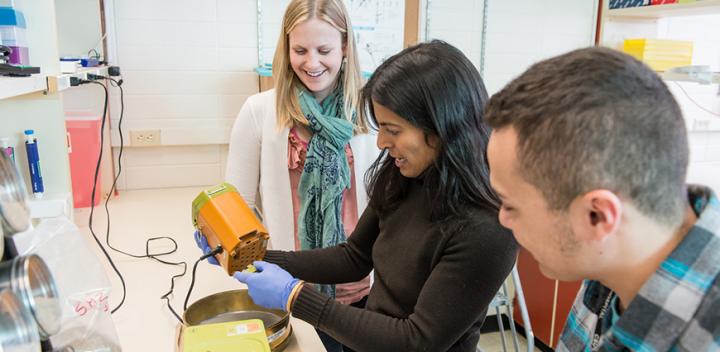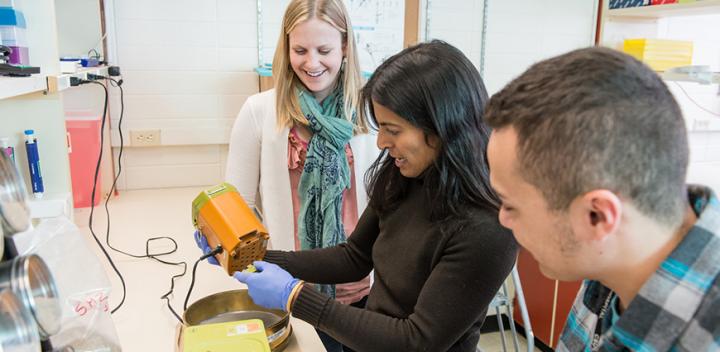
Credit: William A. Cotton/CSU Photography
Today at the American Association for Cancer Research (AACR) Annual Meeting 2017, University of Colorado Cancer Center researchers at Colorado State University present results of a phase II clinical trial of 29 people exploring the effects of adding rice bran or navy beans to the diets of colorectal cancer survivors. After the 4-week randomized-controlled trial during which people added rice bran, navy bean powder or neither, both the rice bran and navy bean groups showed increased dietary fiber, iron, zinc, thiamin, niacin, vitamin B6, folate, and alpha-tocopherol. The rice bran group also showed increased microbiome richness and diversity. When researchers treated colorectal cancer cells with stool extracts from these groups, they saw reduced cell growth from the groups that had increased rice bran and navy bean consumption.
Previous work shows the ability of these diets to decrease colorectal cancer risk in animal models. The current trial confirms that people can eat enough bean- and rice bran-enhanced foods to promote gut health at levels shown to prevent colorectal cancer in animals. Guidelines from the American Institute for Cancer Research recommend reducing the risk of cancer by eating more vegetables, fruits, whole grains and legumes, such as beans. Ryan has established from these studies that eating a half-cup of beans and 30 grams of rice bran per day is enough to see changes in small molecules that can confer protection against colorectal cancer.
"The simple message is, 'Food is medicine,' and we are looking at how to simplify that and make it apply to our everyday lives," says study co-author Regina Brown, MD, assistant professor at the CU School of Medicine and oncologist for CUHealth.
Brown is long-time collaborator of CU Cancer Center investigator and CSU assistant professor, Elizabeth Ryan, PhD. The Ryan Lab in the CSU College of Veterinary Medicine and Biomedical Sciences studies the potential power of navy beans and rice bran to promote digestive health and to prevent metabolic alterations in obesity, heart disease and certain cancers.
"The evidence is there in animals and we can now study this in people. The question is, what are we doing to achieve adequate levels of intake of these foods?" Ryan said. "It's not enough to say 'I eat them once in a while.' That's not going to work, particularly if you are at higher risk. You have to meet a dose, just like you need a dose of a certain drug, you need to reach intake levels and consume increased amounts of these foods, and that's where people, including me, are challenged. Not everyone wants to open up a can of beans and eat them every day."
The two met about 10 years ago, when Ryan was a researcher in CSU professor Henry Thompson's Cancer Prevention Lab, and Brown was practicing medicine in Fort Collins and caring for her mother, who had uterine cancer.
"It was kind of a novel partnership and had we not dug in our heels it could have died, but I told Elizabeth, 'Your work is so interesting and so valuable. We have to take this translational research from the benchtop to the clinic.' I guarantee, nine out of 10 of my patients, the first thing they ask is about their diet," Brown said.
The study's lead author is Erica Borresen, Ryan's research associate and study coordinator, who worked with colorectal cancer survivors to make sure they ate their beans and rice bran provided in meals and snacks, and that they filled out their food logs and gastrointestinal health questionnaires. It was sometimes intimate and awkward, but so is getting a colonoscopy and being treated for colorectal cancer. "Our participants donated their time and effort, and I want to make sure they understand they are appreciated," said Borresen, who earned her Master of Public Health at the Colorado School of Public Health, and plans to become a physician's assistant. "I came to realize I love the patient interaction – that's one of my favorite parts about coordinating our studies."
The next phase of Ryan's research examines effects of the cooked navy bean powder and rice bran on the colon tissue of people who have already had colorectal cancer and are at high risk for recurrence.
"I really feel that there's hope in this being a practical solution to improve gut health and specifically colorectal cancer prevention," says Ryan.
###
Media Contact
Garth Sundem
[email protected]
@CUAnschutz
http://www.ucdenver.edu
############
Story Source: Materials provided by Scienmag





